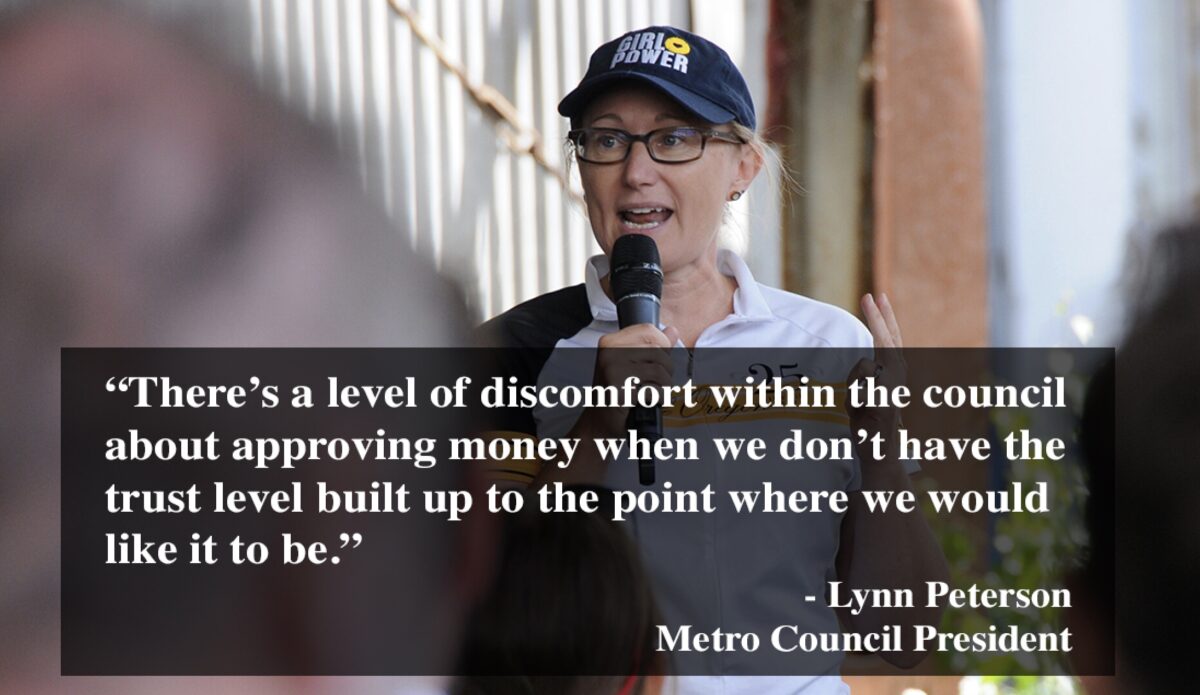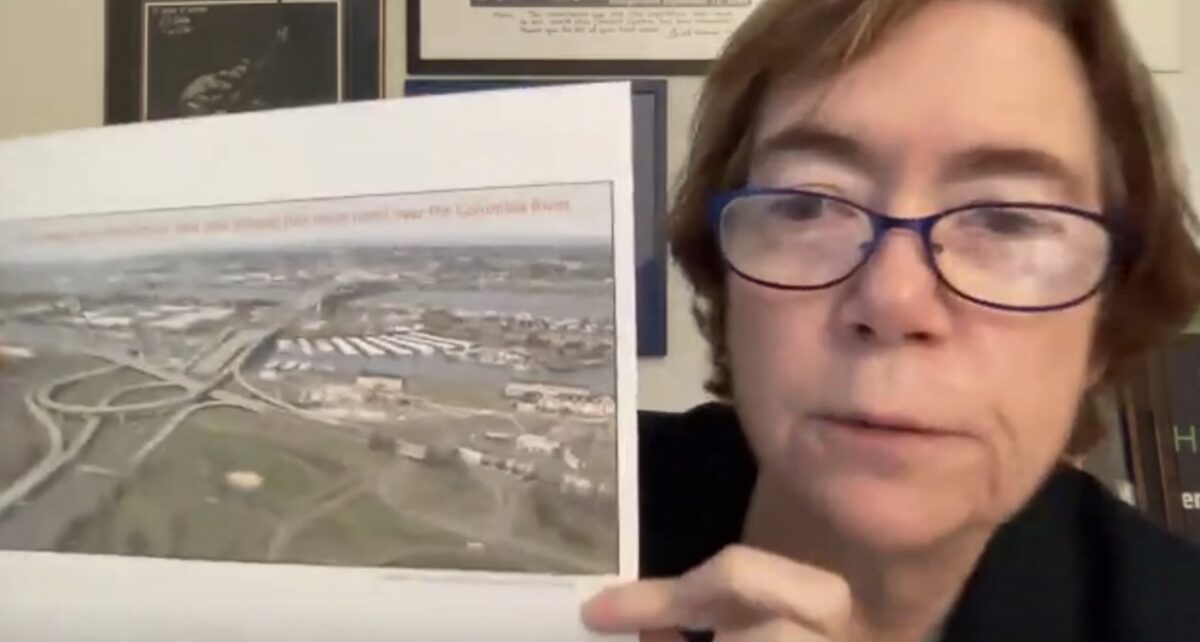
(Photo: Jonathan Maus/BikePortland)
As the “universe of design options” for the second attempt to expand I-5 between Oregon and Washington begins to narrow and the project team seeks to make the highway’s expansion to ten lanes a foregone conclusion by early next year, several members of Metro Council are signalling they aren’t quite ready to advance the project forward.
This marks a rare decision point in a project that has been moving forward very quickly.
At a work session last week to discuss the project, Metro President Lynn Peterson noted there is “a level of discomfort within the council about approving money when we don’t have the trust level built up to the point where we would like it to be.”
Peterson’s comments come as the Oregon Department of Transportation prepares to ask Metro to approve an amendment to the Metropolitan Transportation Improvement Program (MTIP) that would change the status of the Interstate Bridge Replacement program, aka the CRC 2.0, from planning to preliminary engineering, allowing them to access a substantial amount of the expected $135 million that it will cost to fully complete environmental review. Approving the MTIP amendment, the move would allow the project to access $36 million allocated by the Oregon Transportation Commission, in addition to $35 million in funding that has been allocated by Washington.
When asked what might happen if Metro doesn’t approve the amendment, IBR Program Administrator Greg Johnson put it bluntly: “The worst case scenario is that the program doesn’t have the dollars to do what’s necessary and it starts to shut down.”
The Metro Council plans to vote on the amendment December 2nd, following a vote of the Joint Policy Advisory Committee on Transportation (JPACT), which includes members from a broad array of bodies and agencies. This marks a rare decision point in a project that has been moving forward very quickly. Peterson noted that Metro councillors still have a lot of questions about the project that they’d like to get answered before that vote.
During the meeting, it was Councillor Mary Nolan who pushed back hardest on the project, tying the IBR to Oregon’s legislative commitment to reduce emissions from transportation by 45% compared to 1990 levels by 2035. “That’s more than having a few slideshows about climate resilience,” they said. “What steps is your team taking to design to that outcome?” they asked program administrator Greg Johnson.
Advertisement
Johnson’s response to that was revealing in terms of how the project team is approaching the issue of vehicle emissions. “Reducing VMT is an idea that we think will be accomplished by giving folks robust alternatives to those single-occupancy vehicle trips,” he said. “We know there are folks that want to walk or bike, and having that as part of the mix is tremendously important. But we also know there are still going to be folks that are going to drive. And right now there are 143,000 people a day who use the corridor, so we want to make sure that those folks are not adding to greenhouse gases by sitting in unnecessary backups, by doing smart things. Not a freeway expansion, but making the freeway smarter, by putting auxiliary lanes that connect and take those movements that cause folks to stomp on their brakes every time they’re in the corridor.”

In a dramatic moment, Nolan held up a printed-out rendering of the Columbia River Crossing, with its looping interchanges, on-ramps, and imposing footprint on Hayden Island, and asked Johnson, “are you telling me this is not on the table?” Johnson demurred, referencing the slow conversion of vehicles on the roads to electric and returning to the points he made earlier. “We have to do smart things to make sure that traffic isn’t sitting in backups, everyday, for ten hours a day on average.”
Councillor Juan Carlos Gonzalez, on the other hand, seemed less interested in grilling the project team than signalling where he hopes the project is headed. “For me, I can speak for myself…I would like the project to have as small a footprint as possible,” he said.
In August Gonzalez was the only member of the Metro Council to vote against advancing three Portland-area highway projects to the construction phase via MTIP amendments and said at that time that he won’t be voting to approve any highway expansion projects until Oregon prioritizes improvements along the region’s dangerous state-controlled arterials.
Given the tally at that August vote, it seems unlikely that there would be a majority on the Metro Council who are ready to give this project their no vote. But the vote itself may provide the Metro Council, which is asking questions about this approximately $4 billion megaproject that aren’t being asked anywhere else, leverage to get some answers.
— Ryan Packer, @typewriteralley, ryan@theurbanist.org
— Get our headlines delivered to your inbox.
— Support this independent community media outlet with a one-time contribution or monthly subscription.


